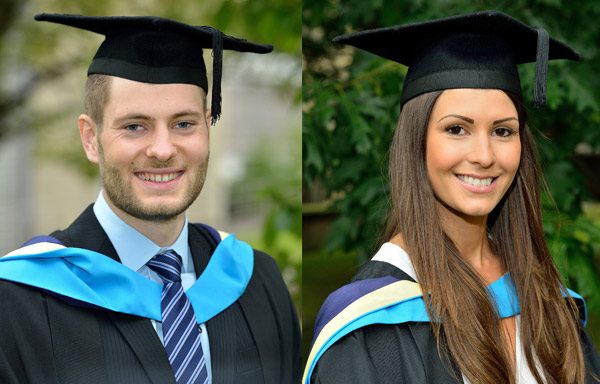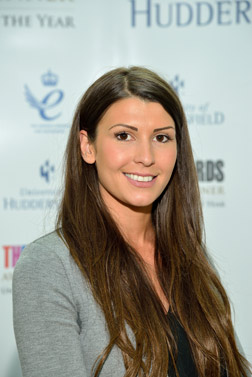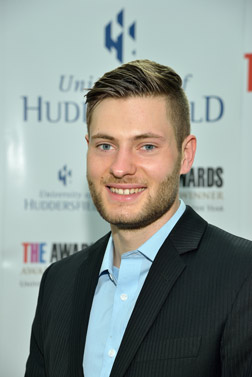Biology students top the sciences at graduation

Fri, 18 Jul 2014 15:25:00 BST
Laura and Ralf receive Chancellor’s Prizes with exceptionally high marks of 84.4% and 86.7%
TWO biology students topped this year’s list of science graduates at the University of Huddersfield.
Laura Wainman, from Thornton in Bradford, and Ralf Wenz, from Böhl-Iggelheim in Germany, achieved the highest average marks in the University’s science subjects, of 84.4% and 86.7% marks respectively.
Marks over 80% are exceptionally high and required considerable work by the student. Laura and Ralf were among a select group of just 72 graduates at Huddersfield who achieved the distinction and all 72 were honoured with the University’s coveted Chancellor’s Prize.
 Laura Wainman
Laura Wainman
Science wasn’t her strongest suit at school, but when she returned to full-time education Laura Wainman found her University of Huddersfield lecturers so inspiring that she became a star student whose exceptionally high marks have earned her a special award.
Laura, who is from Thornton in Bradford, has just graduated with First Class Honours in her BSc biology degree and her average mark over the final two years was 84.4 per cent. This means that she is one of the elite students, scoring 80 per cent plus, who qualify for a Chancellor’s Prize.
Now 24-year-old Laura’s goals include PhD study, possibly in the fields of immunology or evolutionary biology. She might also aim for teaching qualifications.
But she has also set her sights on emigration to Australia, a country she has visited and developed a passion for, especially the weather, she says, and the lifestyle in the western city of Perth.
Animal-lover Laura’s earliest ambition was to be a vet, but disappointing GCSE results at maths and science meant a rethink. Eventually, she took a course in animal management at Kirklees College, before stepping up to degree study at the University of Huddersfield.
“At school I wasn’t really interested in science. I didn’t find it very stimulating,” says Laura. “But the teaching is so different at college and university. The lecturers have got so much specialist knowledge and are so interesting.”
 Ralf Wenz
Ralf Wenz
German student Ralf Wenz gained the highest mark of any science student during his biology degree at the University of Huddersfield, which earned him a coveted Chancellor’s Prize. And there was another bonus, his studies in the UK mean that he now has impeccable English language skills, which will be a major asset for an international career as a researcher in an important area of medical science.
Ralf, now aged 24, is from the town of Böhl-Iggelheim in Germany’s Rhineland, and developed an interest in biology while at school. Then he was conscripted into the army for two years of national service. It was in a parachute regiment, but he would have had to enlist for a further two years in order to receive jump training. He decided on university instead.
“I decided to study abroad because I would learn a language at the same time. I want to do research now and for that, it is essential to know English well,” said Ralf.
Research pointed him in the direction of Huddersfield and the excellence of its teaching. Now he has graduated from his BSc course with ultra-high average marks of 86.7% over the past two years of his course. This means he is one of the elite students who receive a Chancellor’s Prize in 2014.
“Going abroad to study was a big, big step,” said Ralf. To begin with, listening to lectures and reading scientific papers in English was tough, but help and support were readily available and he made rapid progress.
“So in addition to my biology degree, I got first-class English skills for free!” he said.
Ralf’s future involves either PhD research or study for a medical qualification – maybe both. He has a broad range of interests, but immunology is an aspect of biology that has particularly fascinated him and he is drawn to a new and promising field known as cellular immunotherapy, a field that has proved effective in the treatment of cancer.







